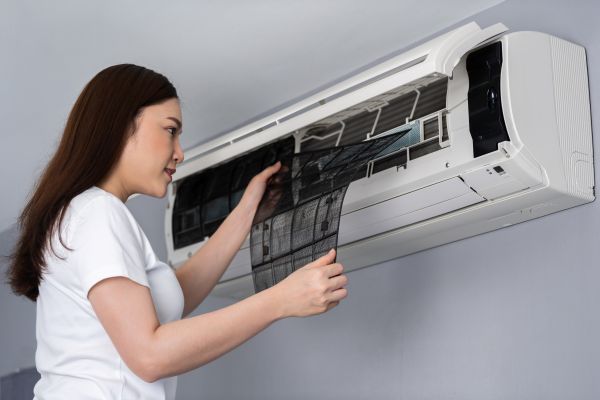Summer is one of the busiest times of year for HVAC professionals. We often respond to frantic homeowners whose AC systems have failed at the worst possible time—when they need them most. As soon as we repair one system, it’s off to the next. HVAC technicians spend their summers working in the heat so that families can stay safe and comfortable.
Many times, the problem occurs because the homeowners were reactive with their maintenance, rather than being proactive. As long as everything seemed like it was working fine, they didn’t give their air conditioners a second thought, right up until they were sweating in the summer heat and facing an expensive emergency air conditioner repair.
In this article, we’ll offer a few of our top tips for avoiding these costly breakdowns and keeping your AC system running efficiently and reliably all season long.
Why Air Conditioning Emergencies Occur
As mentioned above, often, emergencies are a result of homeowners neglecting routine maintenance and basic inspections. Your AC unit, however, is a large and complex system of machinery. Just as you wouldn’t neglect oil changes for your car, you should periodically check everything in your air conditioner to make sure it’s in good working order.
One of the reasons this is important is that your air conditioner is unlikely to be working perfectly, only to suddenly fail. While this sometimes does occur, it’s pretty rare. It’s far more likely that the AC system was gradually losing efficiency and drawing more and more power until an emergency finally occurred. This means that, in the months and years leading up to a catastrophic breakdown, your system was likely working harder than it needed to, driving your energy bill up and contributing to reduced air quality in your home.
Learn to See the Signs of a Poorly Functioning AC Unit
One way to prevent an expensive emergency air conditioner repair is to learn how to listen to what your system is trying to tell you. As we’ve emphasized, HVAC emergencies usually don’t come out of nowhere. Almost always, the signs were there, but the homeowner didn’t see them (or purposefully ignored them).
Some of the key signs that your AC is struggling are:
- Reduced air quality: If you notice your family members are coughing and sneezing more or continuously rubbing their eyes, this could be because your AC unit needs maintenance. It’s possible the filters are dirty and failing to block dust, dirt, and other allergens from entering the indoor atmosphere.
- Increased energy bill: If you’ve looked at your utility costs and wondered why it costs so much more to cool your home this year, it could be because there were more hot days. It could also be because your AC unit isn’t functioning as effectively as before. Keep an eye on your energy bills because they are a good indicator of the health of your system.
- Strange noises or smells: There’s a lot that can go wrong with your HVAC system. Some problems can only be detected by a trained professional, but many issues create telltale signs that you can hear, see, or smell yourself. For example, a distant rattling sound may indicate a broken fan, or a faint burning scent may indicate a system that is overheating due to blocked ventilation.
Regularly Inspect Your AC System
When you call an HVAC company such as All Weather Heating & Cooling for regular inspection and maintenance, we’ll work through an exhaustive checklist to ensure that every element of your HVAC system is in good working order. Between these routine diagnostics, however, you can and should perform more basic inspections and upkeep yourself every once in a while. Some of the things you can do include:
Check the Filters and Change Them If Needed
As your HVAC system circulates air throughout your home, it will carry with it dirt, dust, pollen, pet dander, smoke, and other pollutants. Your system is outfitted with filters to catch these impurities so that the air in your house remains clean. However, the filters will become less effective over time as more and more debris builds up on them.
Filters can be cleaned up to a certain point but will eventually need to be replaced. To do so, remove the vent covers, take out the old filter, slide the new one in, and replace the cover.
Look at the Coolant Coils and Clean Them If They Are Dirty
The central unit of your AC system is made up of an evaporator and condenser, both of which utilize coolant coils to perform their jobs. These coils become dirty over time, and when that happens, they become less efficient and will ultimately fail to perform their work.
Periodically, shut off the system and remove the covers from your condenser and evaporator to check the coils. If they are frozen over, rusted, or covered in dirt and grime, then you will need to clean them with a special foaming coil cleaner, available at most hardware stores.
Keep an Eye on Your Thermostat
The thermostat is the “brain” of your AC unit. It communicates with the interior machinery to tell the system when to cycle on and off. Sometimes, emergency air conditioner repair is necessary even when the hardware is otherwise fine. Faulty wiring or poor connections between the thermostat and the AC unit are often enough to cause the system to fail.
Occasionally, confirm that your thermostat is working correctly: Does it respond to your controls? When you set a temperature, does the system actually achieve that temperature in a reasonable timeframe? If you notice any discrepancies, contact your HVAC professional to address the issue before it worsens.
When to Call the Professionals
The key to preventing emergency air conditioner repair is to be diligent about maintenance. Invest in regular professional inspections and periodically check your system, as outlined above, to make sure everything is functioning properly. If you notice any problems, contact All Weather Heating & Cooling, and we can repair the issue for you, before it becomes an emergency. By addressing problems before they worsen, you’ll avoid any surprises and enjoy a comfortable summer.

